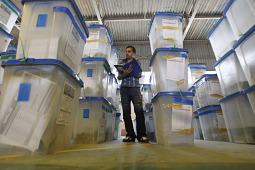Iraqi Elections 2010 — A Turning Point?
Christians Hope Vote Brings Brighter Future for Stressed Community

BAGHDAD — Christians in Iraq are hoping that the parliamentary elections this month will give their community some hope at a time when it is losing members to killings and exile.
Iraqis went to the polls March 7 to elect a new parliament for the second time since adopting a permanent constitution in 2006. Preliminary results announced March 18 showed Prime Minister Nuri al-Maliki’s coalition edging ahead, but some 270,000 out-of-country votes still need to be counted.
Iraqis faced the task of choosing only 325 members for the new parliament from over 6,000 candidates.
With a greatly reduced U.S. military presence in Iraq, many are saying that this election is the most crucial test for the country’s shaky democracy.
“We are optimistic about these elections,” said Yonadam Kanna, a Christian candidate for parliament and the general secretary for the Assyrian Democratic Movement.
In a phone interview from Baghdad on the Saturday before the vote, Kanna stressed that all Iraqis, not just the Christians, “are hoping that these elections can bring change to Iraq, a change for the better.”
Change cannot come soon enough for Iraq’s Christian community. Following the 2003 U.S.-led invasion of Iraq, Iraqi Christians have suffered disproportionately in Iraq’s ongoing sectarian violence. According to United Nations estimates, one in three of Iraq’s 1.5 million Christians has either been killed, fled the country or is an internally displaced person.
Beginning late last year, violence against Iraq’s Christians spiked again. A series of shootings, kidnappings and bombings in the northern city of Mosul so terrified the community that some 4,000 Iraqi Christians fled. In January, Pope Benedict XVI asked his secretary of state, Cardinal Tarcisio Bertone, to deliver a note to al-Maliki, asking that security be increased around places of worship. Mosul Archbishop Emil Shimoun Nona has even said that he fears the Christian community in his city may vanish forever.
Despite the violence, Kanna expects big things from the vote: “The climate and conditions now in Iraq are much better as a state. We have a national army and police, and we hope that this new parliament can be more productive in its work.”
Masoud (Sam) Yono echoed Kanna’s hopes for a changed Iraq. Born in Telkaif, near Mosul, in 1950, Yono graduated from the Jesuit-run Baghdad College High School in 1967, emigrated to Michigan and became a successful businessman and community leader. Yono is Chaldean and a candidate for parliament on the Al-Iraqiya coalition of pro-national, pro-secular candidates headed by former Iraqi Prime Minister Ayad Allawi.
Ballots Rejected?
Speaking by phone from Amman, Jordan, almost one week after the March 7 vote, Yono said, “Our mission is to bring diverse leaders together from all walks of life and all faiths, to lead Iraq into a new phase, a new democratic Iraq, an Iraq for all Iraqis.”
At last count, control of the new parliament was too close to call, with the Al-Iraqiya Alliance running in nearly a dead heat with the State of Law Coalition, which is headed by al-Maliki. A final tally of the votes is not expected until the end of this month.
“The future of Iraq’s Christians, in fact the future of all Iraqis, without question, must lie in a break from our sectarian past and an embrace of nationalism,” Yono said.
Since taking office in 2006, al-Maliki’s government has been criticized for awarding government appointments and contracts to ethnic and political allies. This politicizing of jobs and moneys has devastated Iraqi Christians, leading to an unemployment rate of 80% to 90% in Christian regions like Kirkuk — a rate double that of most of the country.
As the counting of the ballots continues, Yono and others are concerned that Iraqi Christians may again be victims of Iraq’s old sectarian ways.
The Independent High Electoral Commission, which was formed in 2004 by Iraq’s provisional government and the U.N. to oversee elections in Iraq, “is failing to counter what are some very disturbing voting irregularities, especially for Iraqis who are out of the country,” said Yono. “We are seeing thousands of votes from Iraqis being invalidated, many of them that are from Christians living as refugees in the U.S., Canada, Europe and the Middle East.”
According to an e-mail sent March 12 by the Chaldean Federation of America, as many as one-third of the thousands of ballots cast in the U.S., mostly by Assyrian Chaldean Iraqis, have been rejected by the Independent High Electoral Commission.
Joseph Kassab, executive director of the Chaldean Federation of America (CFA), the largest association of Chaldean organizations in the nation, is concerned for the apparent ballot irregularities affecting Iraqis in the United States.
“It is the policy of the CFA to have our people stay in Iraq. That is their ancestral land,” he said. “But in order for them to stay there, you must have the right conditions, such as an end to sectarian violence and chaos — this you do not have.”
Plea to Christians
As for the elections, Kassab would also like to see Iraq turn a corner. The elimination of sectarianism, be it in the form of economic favoritism or violence, could reduce the “push factor” that turns prosperous Iraqis into refugees.
“In these elections, Iraqi Christians can expect five seats in parliament. We will see if they can make Iraq safe for its Christians,” Kassab said.
Elections, he noted, are only part of democracy. Another part of the democratic process is the voice of the people demanding justice for all people.
“With that in mind,” Kassab continued, “we ask that Christians all over the world look at the face of the Christians of Iraq. Look and see the face of their brother or sister in Christ. As Christ said, take care of the stranger, and you will be taking care of me.”
Jeff Gardner writes from Onalaska, Wisconsin.













